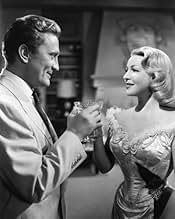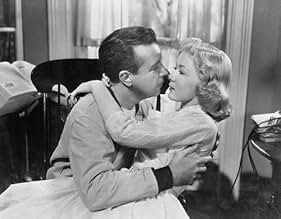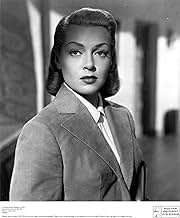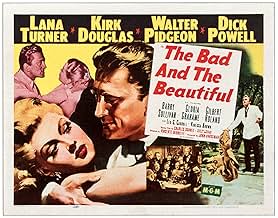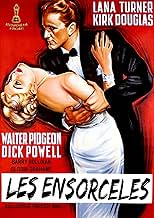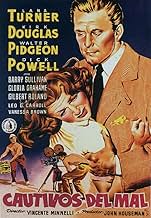CALIFICACIÓN DE IMDb
7.7/10
17 k
TU CALIFICACIÓN
Un productor de películas sin escrúpulos utiliza a una actriz, un director y un escritor para alcanzar el éxito.Un productor de películas sin escrúpulos utiliza a una actriz, un director y un escritor para alcanzar el éxito.Un productor de películas sin escrúpulos utiliza a una actriz, un director y un escritor para alcanzar el éxito.
- Dirección
- Guionistas
- Elenco
- Ganó 5 premios Óscar
- 7 premios ganados y 7 nominaciones en total
Jay Adler
- Mr. Z - Party Guest
- (sin créditos)
Stanley Andrews
- Sheriff
- (sin créditos)
Del Armstrong
- Georgia's Makeup Artist - Screen Test Scene
- (sin créditos)
Ben Astar
- Joe - Party Guest
- (sin créditos)
Barbara Billingsley
- Evelyn Lucien - Costumer
- (sin créditos)
- Dirección
- Guionistas
- Todo el elenco y el equipo
- Producción, taquilla y más en IMDbPro
Opiniones destacadas
A story of betrayals and misunderstandings in the festering underbelly of Hollywood; this is Vincente Minnelli's cool expose of the workings of a producer (Kirk Douglas, as one of the movies' great detestable characters) and the effect he has on those who come into contact with him: a director who feels abandoned yet goes on to produce his greatest work (Barry Sullivan); an actress who is rescued from semi-alcoholism and turned into a star (Lana Turner, in one of her trademark parts); and a prize-winning novelist who is uprooted to shape his book for the screen (Dick Powell, in one of his last film roles before moving into television and film directing).
We see their stories in a series of flashbacks, linked by the three enemies of Douglas coming together in the office of studio biggie Walter Pidgeon who coolly reminds them of the good things the producer brought to their lives along with the bad. There are other good performers in smaller roles Gloria Grahame as Powell's twittery wife, Gilbert Roland as the Latin temptation, and so on. The Bad and the Beautiful', filmed in good old black and white, has plenty of meat to keep you watching. Only the slightly twee ending lets it down, but you can't have everything.
We see their stories in a series of flashbacks, linked by the three enemies of Douglas coming together in the office of studio biggie Walter Pidgeon who coolly reminds them of the good things the producer brought to their lives along with the bad. There are other good performers in smaller roles Gloria Grahame as Powell's twittery wife, Gilbert Roland as the Latin temptation, and so on. The Bad and the Beautiful', filmed in good old black and white, has plenty of meat to keep you watching. Only the slightly twee ending lets it down, but you can't have everything.
My tribute to the great Hollywood film composer, David Raksin, is long overdue. I only discovered the other day that he died a couple of summers ago at the considerable age of 92. I suppose I had thought that like most of those figures who reached their peak in the middle of the last century he had passed away many years ago. A re-seeing of "The Bad and the Beautiful" fairly recently reminded me of just how outstanding was his contribution to movies of all shades of quality. I first became aware of the uniqueness of the Raksin 'sound' on my original viewing of Wyler's "Carrie" in 1952. It is impossible to define, other than to say that it owes nothing to central European romanticism, the sound of almost all the in-house studio composers such as Newman, Stothart and Steiner, or to the tradition of 20th century symphonists such as Copland and Diamond which fed the imagination of film composers as diverse as Elmer Bernstein and David Amram. Raksin had a sound all his own as did Bernard Herrmann and Miklos Rozsa, as instantly recognisable as theirs but I feel his range is wider. He seldom repeated himself as did Rozsa who composed in the same style regardless of genre. ("Double Idemnity", "Ben-Hur" and "Madame Bovary" have nothing common apart from their same sort of watered down Kodaly-like music.) His style is intensely lyrical, conceived with a verve and passion that always transcended the most trivial movies and made them, if not worth watching, always worth listening to. Unlike many of his colleagues he seldom hit the jackpot by working on films of great quality. I think it only happened twice, with Abraham Polonsky's B movie "Force of Evil" which has become recognised as a marvellous example of film noir and of course William Wyler's "Carrie" where he was just one of many outstanding contributors to what I have long argued is possibly the greatest work of art to have ever emerged from the Hollywood studio system. Although it has its passionate advocates, I cannot share their enthusiasm for Vincente Minnelli's "The Bad and the Beautiful". It is certainly very professional in the way it slickly dissects an unsympathetic character through the flashback reminiscences of those he mistreated, but it had all been done before and considerably better in "Citizen Kane" and "All About Eve". However the film is worth watching if only to wallow in Raksin's gorgeous score. And there is plenty of it, particularly in accompanying all those voice-off narrations. And then just as one is beginning to wonder if the marvellous opening credit theme is about to be heard once too often, the composer introduces something entirely new for the Dick Powell narrative, a jaunty section based on a four-note motif (a falling perfect fifth, rising up a major sixth, then down a major seventh). The way this is subsequently developed is truly symphonic. Incidentally if you want to discover a film score that has the length and complexity of a symphony just close your eyes (you won't be missing much) and listen to "Forever Amber". Raksin in excelsis!
Winning an Oscar has nothing to do with the amount of on screen time, so the shortness of Grahame's role does not bother me. However, her cartoonish interpretation of a Southern Belle is simply not worthy of an Academy Award, especially when the role is intended to be seriously dramatic. Jean Hagen most certainly deserved the Supporting Actress honor for her APPROPRIATE comedic turn as an over-the-top, unfortunately voiced silent film actress in "Singing in the Rain." And, folks, that scene with an hysterical Lana Turner driving in the rain is, well, HYSTERICAL.
VM was an excellent director, but some of his films, especially the overwrought melodramas, simply do not hold up. Yes, they always look great, but often the performances in the dramas are of the scenery-chewing variety.
In regards to another user's post, I agree that the scenario of Powell's character identifying his wife is ridiculous. The same thought immediately crossed my mind when seeing it for the first time.
My feelings towards Douglas's performance are mixed. At times he hits the mark, but at others, it is pure ham.
The film is definitely worth seeing, but it does not deserve the status of "classic." Its presentation of the industry is clichéd. As others have stated, "Sunset Boulevard" blows this film out of the water.
VM was an excellent director, but some of his films, especially the overwrought melodramas, simply do not hold up. Yes, they always look great, but often the performances in the dramas are of the scenery-chewing variety.
In regards to another user's post, I agree that the scenario of Powell's character identifying his wife is ridiculous. The same thought immediately crossed my mind when seeing it for the first time.
My feelings towards Douglas's performance are mixed. At times he hits the mark, but at others, it is pure ham.
The film is definitely worth seeing, but it does not deserve the status of "classic." Its presentation of the industry is clichéd. As others have stated, "Sunset Boulevard" blows this film out of the water.
Producer Jonathan Shields is in big trouble on a production and reaches out to three people he's befriended and betrayed in the past for help. All three are brought to Harry Pebbel's office where he makes a pitch for the help of each one. And we're told in flashback the dynamics of the relationships between Shields and each one.
One thing about Tinseltown, they've never been afraid to show the seamier side of movie-making. Kirk Douglas's Jonathan Shields is a not too thinly disguised version of David O. Selznick. The same drive, the same ambition, the same overwhelming ego that Selznick was legendary for is a part that was tailor made for Kirk Douglas.
The three betrayed people, director Fred Amiel(Barry Sullivan), star Georgia Lorrison(Lana Turner), and screenwriter James Lee Barlow(Dick Powell)all ring very true. One of the things I like about this film is that all three stories, each in itself, could be expanded into a film all it's own.
Lana Turner's role as the ersatz Diana Barrymore is not to hard to spot either. It's so much better here than the film based on her own book Too Much Too Soon. If that voice of Turner's actor father on those 78 rpms she's playing sounds familiar, it's that of Louis Calhern. Turner's was a life lived out all too well in the tabloids and she brings all of it to bear in playing Gerogia Lorrison.
Dick Powell, who was offered the lead as Jonathan Shields, opted to play tweedy professor turned screenwriter James Lee Barlow. This was Powell's next to last feature picture as an actor, it should have been the one he went out on. Powell was always ahead of the industry's cutting edge and he decided to concentrate more on directing and acting for the small screen.
Powell's segment includes Gloria Grahame as his flirty wife. Post World War II Hollywood, whenever it had a part for a tramp, first call Gloria Grahame. Here she responds with an Academy Award winning performance. She hasn't many scenes, but as was said in another MGM picture around that time, what there is is cherce.
I don't think there's ever been an actor who can go from zero to sixty on the emotional scale as quickly as Kirk Douglas. Check the scene when Lana Turner discovers how Douglas betrayed her. The intensity of his reaction alone is frightening and real. Douglas was also up for an Oscar, but it went that year to laconic Gary Cooper in High Noon.
Vincente Minelli put all the pieces together just right and it comes out great entertainment.
One thing about Tinseltown, they've never been afraid to show the seamier side of movie-making. Kirk Douglas's Jonathan Shields is a not too thinly disguised version of David O. Selznick. The same drive, the same ambition, the same overwhelming ego that Selznick was legendary for is a part that was tailor made for Kirk Douglas.
The three betrayed people, director Fred Amiel(Barry Sullivan), star Georgia Lorrison(Lana Turner), and screenwriter James Lee Barlow(Dick Powell)all ring very true. One of the things I like about this film is that all three stories, each in itself, could be expanded into a film all it's own.
Lana Turner's role as the ersatz Diana Barrymore is not to hard to spot either. It's so much better here than the film based on her own book Too Much Too Soon. If that voice of Turner's actor father on those 78 rpms she's playing sounds familiar, it's that of Louis Calhern. Turner's was a life lived out all too well in the tabloids and she brings all of it to bear in playing Gerogia Lorrison.
Dick Powell, who was offered the lead as Jonathan Shields, opted to play tweedy professor turned screenwriter James Lee Barlow. This was Powell's next to last feature picture as an actor, it should have been the one he went out on. Powell was always ahead of the industry's cutting edge and he decided to concentrate more on directing and acting for the small screen.
Powell's segment includes Gloria Grahame as his flirty wife. Post World War II Hollywood, whenever it had a part for a tramp, first call Gloria Grahame. Here she responds with an Academy Award winning performance. She hasn't many scenes, but as was said in another MGM picture around that time, what there is is cherce.
I don't think there's ever been an actor who can go from zero to sixty on the emotional scale as quickly as Kirk Douglas. Check the scene when Lana Turner discovers how Douglas betrayed her. The intensity of his reaction alone is frightening and real. Douglas was also up for an Oscar, but it went that year to laconic Gary Cooper in High Noon.
Vincente Minelli put all the pieces together just right and it comes out great entertainment.
"The Bad and the Beautiful" takes a look at Hollywood. This incisive take about how movies are made, directed by Vincente Minnelli, dares to go behind the scenes to show what goes on in the way the film industry operates. The film adaptation by Charles Schnee gives us a good idea of that unreal world of fantasy and hype.
At the center of the story is Jonathan Shields, a young man with connections to the industry. He wants to follow his father's footsteps and goes at it vigorously, making friends and enemies along the way. Jonathan discovers he can be ruthless whenever he wants. His first victim is Fred Amiel, the talented director who Jonathan bypasses in favor of a more established one. Jonathan quickly forgets the friendship Fred and his wife showed him before becoming a big producer.
Then there is there is Georgia Larrion, the boozy daughter of a famous actor. Jonathan shows how he wants Georgia to succeed in the business, personally taking care of selling her to star in his big project, only to betray her with another woman, a glamorous bit player. When Georgia discovers the truth, she flees Jonathan's mansion in a clear night that suddenly turns into a torrential downpour and loses control of the car, but she doesn't suffer a scratch!
The last victim of Mr. Shields is the Pulitzer prize winner, James Lee Bartlow, who Jonathan coaxes into leaving his academic life to adapt his own novel for the movies. James is married to the flighty Rosemary, in whom Jonathan discovers a weak link that will do anything to hobnob with the celebrities. Jonathan makes it easy for Rosemary to fall into an affair with the star of Shields' film.
When we first watched this film, it seemed much better, than on this viewing where a lot of things surface to make some of the story much weaker than before. Some viewers have compared this film with the fate of Orson Welles in Hollywood, and there are a couple of references that could be interpreted that way. Whether it was so, or not, it's up to the viewer to guess where the truth lies.
Kirk Douglas gave a strong performance as Jonathan Shields. Mr. Douglas showed he clearly understood who this man was. He runs away with the film, in our humble opinion. Lana Turner, a beautiful presence in any movie, is good, but at times she appears to be overwhelmed by the range of emotions she has to project, especially with that phony car scene.
Dick Powell and Gloria Graham put in an excellent appearance as the Bartlows. Barry Sullivan disappears after Lana shows up, not to be seen until the end. Walter Pigeon is effective as the studio head. Gilbert Roland is perfect as Gaucho, the Latin actor with a lot of charisma.
Mr. Minnelli shows he wasn't afraid to portray the industry the way we see it in the film, not a small accomplishment, knowing well how it could have backfired on him. Hollywood is not forgiving to those who dare to show its ugly side and that's when the parallel with Orson Welles problems with the system and eventual exile can be drawn.
At the center of the story is Jonathan Shields, a young man with connections to the industry. He wants to follow his father's footsteps and goes at it vigorously, making friends and enemies along the way. Jonathan discovers he can be ruthless whenever he wants. His first victim is Fred Amiel, the talented director who Jonathan bypasses in favor of a more established one. Jonathan quickly forgets the friendship Fred and his wife showed him before becoming a big producer.
Then there is there is Georgia Larrion, the boozy daughter of a famous actor. Jonathan shows how he wants Georgia to succeed in the business, personally taking care of selling her to star in his big project, only to betray her with another woman, a glamorous bit player. When Georgia discovers the truth, she flees Jonathan's mansion in a clear night that suddenly turns into a torrential downpour and loses control of the car, but she doesn't suffer a scratch!
The last victim of Mr. Shields is the Pulitzer prize winner, James Lee Bartlow, who Jonathan coaxes into leaving his academic life to adapt his own novel for the movies. James is married to the flighty Rosemary, in whom Jonathan discovers a weak link that will do anything to hobnob with the celebrities. Jonathan makes it easy for Rosemary to fall into an affair with the star of Shields' film.
When we first watched this film, it seemed much better, than on this viewing where a lot of things surface to make some of the story much weaker than before. Some viewers have compared this film with the fate of Orson Welles in Hollywood, and there are a couple of references that could be interpreted that way. Whether it was so, or not, it's up to the viewer to guess where the truth lies.
Kirk Douglas gave a strong performance as Jonathan Shields. Mr. Douglas showed he clearly understood who this man was. He runs away with the film, in our humble opinion. Lana Turner, a beautiful presence in any movie, is good, but at times she appears to be overwhelmed by the range of emotions she has to project, especially with that phony car scene.
Dick Powell and Gloria Graham put in an excellent appearance as the Bartlows. Barry Sullivan disappears after Lana shows up, not to be seen until the end. Walter Pigeon is effective as the studio head. Gilbert Roland is perfect as Gaucho, the Latin actor with a lot of charisma.
Mr. Minnelli shows he wasn't afraid to portray the industry the way we see it in the film, not a small accomplishment, knowing well how it could have backfired on him. Hollywood is not forgiving to those who dare to show its ugly side and that's when the parallel with Orson Welles problems with the system and eventual exile can be drawn.
¿Sabías que…?
- TriviaAt 9 minutes and 32 seconds, Gloria Grahame's performance in this movie became the shortest to ever win an Oscar. She held the record until 1976, when Beatrice Straight won for her 5 minute performance in Poder que mata (1976).
- ErroresThe story takes place over an 18-year period, roughly 1934-1952, but the hairstyles and clothing of all the women, from beginning to end, are strictly 1952.
- Versiones alternativasAlso available in a computer colorized version.
- ConexionesFeatured in Mundo, carne y deseo (1959)
Selecciones populares
Inicia sesión para calificar y agrega a la lista de videos para obtener recomendaciones personalizadas
- How long is The Bad and the Beautiful?Con tecnología de Alexa
Detalles
- Fecha de lanzamiento
- País de origen
- Idioma
- También se conoce como
- The Bad and the Beautiful
- Locaciones de filmación
- Productora
- Ver más créditos de la compañía en IMDbPro
Taquilla
- Presupuesto
- USD 1,558,000 (estimado)
- Total a nivel mundial
- USD 2,025
- Tiempo de ejecución1 hora 58 minutos
- Color
- Relación de aspecto
- 1.37 : 1
Contribuir a esta página
Sugiere una edición o agrega el contenido que falta

Principales brechas de datos
What is the Japanese language plot outline for Cautivos del mal (1952)?
Responda


